Visitor Info FAQs
Here’s some general Vanuatu destination information via some frequesntly asked questions (FAQs) from some of our guests…
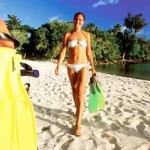 What makes Vanuatu different/better than other Pacific destinations?
What makes Vanuatu different/better than other Pacific destinations?
As the Vanuatu Tourism slogan says, “Discover What Matters”. Vanuatu is a rare destination where you can not only discover rewarding things to experience and see, but also discover a lot about yourself and the things that are important in life. There are great resorts but there’s also much to do and see outside the resorts. At the end of this page is a more detailed personal look at what makes Vanuatu so different to the Pacific’s most popular destination, Fiji.
Is the tap water safe to drink?
 Yes, Port Vila water is perfectly safe to drink. It does, however, have a high calcium content so those little white specks floating in your tea doesn’t mean the milk is ‘off’ (it will be long-life milk anyway!). Having said that, you can buy bottled water. It is important to keep hydrated in the tropics. Maybe buy a bottle on arrival and each night fill with tap water and put in the fridge so you have a bottle of water to take with you in the morning.
Yes, Port Vila water is perfectly safe to drink. It does, however, have a high calcium content so those little white specks floating in your tea doesn’t mean the milk is ‘off’ (it will be long-life milk anyway!). Having said that, you can buy bottled water. It is important to keep hydrated in the tropics. Maybe buy a bottle on arrival and each night fill with tap water and put in the fridge so you have a bottle of water to take with you in the morning.
Should we take anti-malaria medication?
Despite what your doctor may say, anti-malaria tablets aren’t necessary or recommended unless you are going to the outer islands. The Honeymoon Vanuatu team has collectively has lived in Vanuatu for over 20 years and we have not seen a single case of malaria on the main island of Efate. Apparently mosquitoes only travel a distance akin to a lounge room in a lifetime and, once eradicated, malaria mossies are easy to keep eradicated. We don’t know of any cases on Tanna and Santo island either – Malekula, Torres and Banks Islands, suggest taking care.
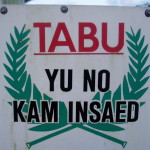 For comfort, we suggest taking some mossie repellent, just in case there are a few mosquitoes about. They are pretty rare but if they are about they somehow seek out the ladies. Softer skin perhaps? You don’t need vaccinations against exotic tropical diseases but you may want to have an up-to-date tetanus shot in case of coral cuts (you can get this after the event) and travellers should take out medical insurance. While there are good doctors in Port Vila and regular flights out, you shouldn’t travel anywhere without insurance.
For comfort, we suggest taking some mossie repellent, just in case there are a few mosquitoes about. They are pretty rare but if they are about they somehow seek out the ladies. Softer skin perhaps? You don’t need vaccinations against exotic tropical diseases but you may want to have an up-to-date tetanus shot in case of coral cuts (you can get this after the event) and travellers should take out medical insurance. While there are good doctors in Port Vila and regular flights out, you shouldn’t travel anywhere without insurance.
The photo, BTW, is just a bit of Bislama – when you see Bislama, say it out loud – ‘Taboo – You No Come Inside’…
Can we take local woodcarvings back home with us?
![500298091-300x201[1]](http://www.honeymoonvanuatu.com/wp-content/uploads/2013/06/500298091-300x2011-150x150.jpg) You can take wood carvings home with you, as long as you present them at Customs for inspection. It is rare that they won’t be allowed to go through but if they seem a tad dodgy, Customs may decide to spray. Apart from wood carvings as souvenirs you can also take bags of kava or local beef! Email us if you want info on how to get the beef exporter’s licence – costs around $12 and you will impress at a home BBQ with Vanuatu grown steak!
You can take wood carvings home with you, as long as you present them at Customs for inspection. It is rare that they won’t be allowed to go through but if they seem a tad dodgy, Customs may decide to spray. Apart from wood carvings as souvenirs you can also take bags of kava or local beef! Email us if you want info on how to get the beef exporter’s licence – costs around $12 and you will impress at a home BBQ with Vanuatu grown steak!
When is the best time to visit Vanuatu weather-wise?
That’s a hard question to answer, both because of changing world climate patterns and personal comfort levels. The climate can be hot and humid. While historically November to March is the ‘wet’ season, over the last couple of years El Nino has sort of reversed the seasons. The locals (ni-Vanuatu) find the winter months a bit ‘cool’ and may be seen in jeans and beanies but visitors will still be happy wearing short sleeves and swimming. If you don’t like heat and humidity, perhaps avoid October to March – but temps aren’t exteme like in Australia (see next question)…
What are the average temperatures and are there defined seasons?
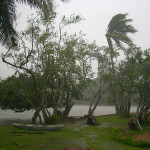 There aren’t four seasons like in Australia and New Zealand. While the seasons sort of blend, lets say there are two seasons. Summer is from November to March and the average temperature is 28°C (can get up to 32°C) but the humidity makes it feel hotter. Winter is from April to October with the temperature averaging 23°C. Sea temperature varies from 22 to 28 °C making swimming enjoyable all year round. As they say, whatever the weather, have a nice day!
There aren’t four seasons like in Australia and New Zealand. While the seasons sort of blend, lets say there are two seasons. Summer is from November to March and the average temperature is 28°C (can get up to 32°C) but the humidity makes it feel hotter. Winter is from April to October with the temperature averaging 23°C. Sea temperature varies from 22 to 28 °C making swimming enjoyable all year round. As they say, whatever the weather, have a nice day!
What are the chances of a cyclone or an earthquake ruining our holiday?
There are occasional cyclones but they come, they go and they are part of the tropics (even in Australia). There are also occasional earth tremors, as there are in any place with volcanic activity (like New Zealand). The weather shouldn’t dictate whether/when you should travel and it is mostly pretty wonderful.
Should we change money into the local currency before we go to Vanuatu?
 No. It is a hassle to get the bank to get the currency in and the exchange rate will be lousy. They worst exchange rate will be at the airport on departure. There is a money exchange bureau on arrival at Port Vila’s Bauerfield International Airport or wait until the banks/shops open in town. Use cash to exchange or debit card. The local currency is the vatu and the exchange rate is stable. All major credit cards are accepted and there are ATM’s at supermarkets, the airport and outside the ANZ and Westpac banks. The best exchange rate is at Goodies souvenir shops in the main street. And of course there is no truth to the rumors that Vanuatu is a tax haven where money can be laundered!!! A sunny place for shady characters? Never!
No. It is a hassle to get the bank to get the currency in and the exchange rate will be lousy. They worst exchange rate will be at the airport on departure. There is a money exchange bureau on arrival at Port Vila’s Bauerfield International Airport or wait until the banks/shops open in town. Use cash to exchange or debit card. The local currency is the vatu and the exchange rate is stable. All major credit cards are accepted and there are ATM’s at supermarkets, the airport and outside the ANZ and Westpac banks. The best exchange rate is at Goodies souvenir shops in the main street. And of course there is no truth to the rumors that Vanuatu is a tax haven where money can be laundered!!! A sunny place for shady characters? Never!
What sort of clothing should we take?
Basically cool, cotton and casual. Short sleeves and shorts will be fine during the day year round but a light jumper or jacket and long trousers/skirt can be handy in the cooler months. While swimming costumes are suitable poolside at your resorts they shouldn’t be part of the dress code outside the resorts. Modesty is the order of the day for women in public places, mainly in the short skirt/shorts department. Exposed thighs can be considered offensive – even in traditional island villages you may find women topless – but they will also be wearing an ankle length skirt!
Are there any good guidebooks on Vanuatu?
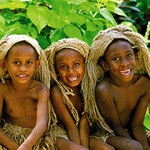 Guidebooks are pretty thin on the ground for Vanuatu. Lonely Planet is, as always, reliable but about half the book is on other islands and not focussed on Efate where most visitors spend their holiday. Moon Handbooks South Pacific, written by David Stanley, is an excellent publication but not available in Australian bookshops. Visit the Vanuatu section of David’s website, The South Pacific Organiser. Of course we think our own Vanuatu A to Z isn’t too shabby!
Guidebooks are pretty thin on the ground for Vanuatu. Lonely Planet is, as always, reliable but about half the book is on other islands and not focussed on Efate where most visitors spend their holiday. Moon Handbooks South Pacific, written by David Stanley, is an excellent publication but not available in Australian bookshops. Visit the Vanuatu section of David’s website, The South Pacific Organiser. Of course we think our own Vanuatu A to Z isn’t too shabby!
Do we need to get a visa?
Not for a holiday. Visas for stays not exceeding 30 days are given on arrival – visitors from countries including USA, Australia, New Zealand, Canada, Japan, Philippines, South Korea, the UK, Norway, Switzerland, EU countries and Fiji do not require a visa. Permission is usually granted for an extension of up to four months simply by applying. For longer stays visas are only obtainable from The Immigration Department, Port Vila, Vanuatu. PMB 014, Tel: 22 354, Fax: 25 492. The automatic entry visa is not a work permit though…
Should we be wary of local insects like spiders?
![3510598270_a8032359251-294x300[1]](http://www.honeymoonvanuatu.com/wp-content/uploads/2013/06/3510598270_a8032359251-294x3001-150x150.jpg) There are no real poisonous ‘nasties’ (spiders, insects, animals or reptiles) in Vanuatu. If you see a centipese, give it a wide berth. The snakes are gentle pythons and fairly rare.The large spiders are harmless and pretty.
There are no real poisonous ‘nasties’ (spiders, insects, animals or reptiles) in Vanuatu. If you see a centipese, give it a wide berth. The snakes are gentle pythons and fairly rare.The large spiders are harmless and pretty.
Coral, however, can cut and there are some spiky marine creatures that can hurt so reef shoes are recommended. If you do get a coral cut, a squeeze of lime or lemon is a natural remedy or see reception for some hydrogen peroxide and antiseptic. In the tropics, cuts should be covered.
You may see sea snakes when snorkelling – they will endeavour to get out of your way and we have never heard of anyone being bitten – they have tiny mouths.
Can I get some part-time work while in Vanuatu to help pay for the stay?
In a nutshell, nope! Working permits are only given to people who will be working in a job that the ni-Vanuatu people will not be qualified for – example, teacher at the International School, resort manager, accountant with knowledge of the Australian and New Zealand tax systems.
Is alcohol expensive?
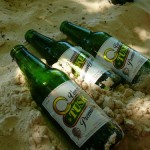 In bottle shops, bars and resturants – yes – in duty free stores – no. Imported beer, wine and spirits have the freight cost plus local duty. The local beer, Tusker, is good and inexpensive – there is no local wine and local spirits are only good if you have some furniture in need of stripping. French champagne is less expensive in Vila than in Australia or New Zealand but for Aussie or NZ wine, as a rule of thumb, double your local price for bottle shop Port Vila prices and double that again for restaurants. It is still a lot less expensive than places like Bali. Take advantage of duty free on departure if you like a pre-dinner drink or two in your room. Go with the flow and enjoy – if you are the type who complains about the cost of things when travelling perhaps you should consider not drinking or not travelling. With the average stay in Vanuatu being seven days, even if you pay twice as much for alcohol, isn’t that cheap for a lifetime of wonderful memories?
In bottle shops, bars and resturants – yes – in duty free stores – no. Imported beer, wine and spirits have the freight cost plus local duty. The local beer, Tusker, is good and inexpensive – there is no local wine and local spirits are only good if you have some furniture in need of stripping. French champagne is less expensive in Vila than in Australia or New Zealand but for Aussie or NZ wine, as a rule of thumb, double your local price for bottle shop Port Vila prices and double that again for restaurants. It is still a lot less expensive than places like Bali. Take advantage of duty free on departure if you like a pre-dinner drink or two in your room. Go with the flow and enjoy – if you are the type who complains about the cost of things when travelling perhaps you should consider not drinking or not travelling. With the average stay in Vanuatu being seven days, even if you pay twice as much for alcohol, isn’t that cheap for a lifetime of wonderful memories?
Should we tip in bars, restaurants and taxis and if so, how much?
Tipping is not part of Melanesian culture. The ni-Vanuatu people are among the friendliest in the world and a smile and ‘tank yu tumas’ (thanks a lot) is plenty. Lately some bus and taxi drivers have been getting greedy on the days when cruise ships are in town. Don’t encourage it as it erodes the traditional culture!
Finally…
FIJI or VANUATU?
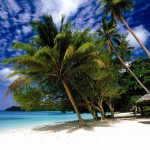 It’s different strokes for different folk, really. Most Fiji holidays/honeymoons will take you to the one resort (with possibly a second island resort). While these resorts, on the whole, are terrific, you usually don’t get to see/do much outside your resort. If rest, romance, relaxation and colourful cocktails by the pool are your thing, perhaps Fiji…
It’s different strokes for different folk, really. Most Fiji holidays/honeymoons will take you to the one resort (with possibly a second island resort). While these resorts, on the whole, are terrific, you usually don’t get to see/do much outside your resort. If rest, romance, relaxation and colourful cocktails by the pool are your thing, perhaps Fiji…
Fiji has what we call the ‘Bula factor’. The Fijians greet you with outgoing flashing smiles and “Bula” – the ni-Vanuatu people are more shy and reserved (but just as friendly).
Here are a few things that swing us to Vanuatu…
- The richness of the Melanesian culture and the unique Bislama language…
- The accessibility to good snorkelling, diving & deep-sea fishing, waterfalls, rivers and cruises…
- The French influence…
- Dining out – there is a range of excellent, accessible restaurants. The Vanuatu beef is the best you’ll ever taste and the seafood sensational …
- Island time – while things may happen slowly (and occasionally be frustrating) it’s this atmosphere that really makes you unwind…
- Safety and no hassles – you won’t be badgered by souvenir or copy watch vendors beating down a price in Vanuatu there’s no haggling or tipping in Melanesian culture…
- Availability of luxuries and necessities – everything you get at home, you’ll find in the shops, supermarkets and chemists. Things you won’t find at home include hair braiding, fresh produce from the markets, duty free shopping and baby-sitting for under $15.00 a night.
We have compiled what we believe to be the definitive information web site, Vanuatu A to Z, but if you have any specific queries, drop us an email and we’ll do the best to help you out.
Lukim yu! (‘See you’ in the local language, Bislama)


